11th and 12th century
Irnerio
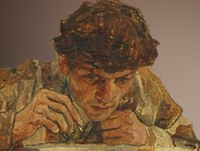 Judge, Master of Liberal Arts and Roman Law.
Judge, Master of Liberal Arts and Roman Law.
A scholar and master of Corpus Iuris Civilis, Irnerio represents the first generations of teachers around whom the Bologna schools of Roman Law – the forerunners of future Universities – were spontaneously created.
Pepone (Pepo)
Jurist and Master of Roman Law.
A largely unknown figure, Pepone left traces of himself as an expert jurist at the court of the Canossa family, who also ruled Bologna in the late 11th century.
Bulgaro
Jurist and Master of Roman Law.
Perhaps the most important of the four disciples of Irnerio, Bulgaro, “Mouth of Gold”, was the most dutiful in following the Justinian precepts of the Corpus Iuris Civilis, analysed and imparted in his renowned School.
Martino Gosia
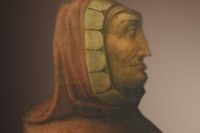 Jurist and Master of Law.
Jurist and Master of Law.
Compared to the other disciples of Irnerio, Martino, the connoisseur “of many laws”, succeeded in combining the Roman Law of the Corpus Iuris Civilis with Canon and Germanic Law.
Ugo di Porta Ravegnana
Jurist and Master of Roman Law.
Like the other disciples of Irnerio, the young Ugo, the “mind of the law”, set up his own school of Glossators, scholars seeking to bring order to the chaos of the Middle Ages through Roman Law.
Biography of Ugo di Porta Ravegnana
Iacopo di Porta Ravegnana
Jurist and Master of Roman Law.
‘Jacobus id quod ego’: for centuries, this quote was taken to mean that the dying Irnerio designated Iacopo as head of his school after his death. In fact, it may simply indicate a greater affinity between the two than with the others.
Biography of Iacopo di Porta Ravegnana
Graziano
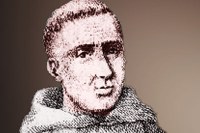 Camaldolese Monk, Jurist and Master of the Liberal Arts, Author of Decretum Gratiani and Founder of Canon Law.
Camaldolese Monk, Jurist and Master of the Liberal Arts, Author of Decretum Gratiani and Founder of Canon Law.
While Irnerio based his School of Roman Law on Justinian’s Corpus Iuris Civili, Graziano, founder of the School of Canon Law, had no such structured historical reference. He himself created the foundations of the future Corpus Iuris Canonici, collecting in his Decretum and imparting to his pupils an age-old ecclesiastical and legal heritage that had never before been analysed with rigour.
13th century
Rolandino de’ Passaggeri
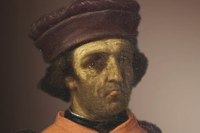 Notary, Politician and Master of Notarial Art.
Notary, Politician and Master of Notarial Art.
The political and social rise of Rolandino de' Passaggeri was quite exceptional in the history of Bologna. At that time, the city sought internal stability and fought against the imperial power. To this end, it turned to the diplomatic yet strenuously independentist expertise of the illustrious Notary, whose extraordinary power, pre-empting that of the Signorias, countered the magnates, Ghibellines and opponents of his renowned School.
Biography of Rolandino de' Passaggeri
Egidio Foscherari (Foscarari)
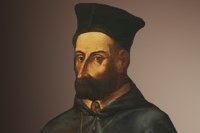 Jurist and Master of Canon Law.
Jurist and Master of Canon Law.
The first layman to teach Canon Law at the University of Bologna, Egidio Foscherari made his fortune through his profession as a teacher and town councillor during the difficult years of the clashes between the Guelphs and Ghibellines. His tomb in the town square of San Domenico still bears witness to his status.
Biography of Egidio Foscherari (Foscarari)
Accursio
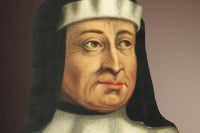 Jurist, Master of Roman Law and Editor of Magna Glossa.
Jurist, Master of Roman Law and Editor of Magna Glossa.
With his Magna glossa, a systematic collection of 97,000 annotations on the Corpus Iuris Civilis, it is as if Accursio wanted to summarise the work of the School of Glossators, which in Bologna had been focusing on the interpretation of the Justinian legal text since the University’s early days. After his generation, the School of Commentators would rise, and with it a new season of analysis and dissemination of Roman Law.
Taddeo Alderotti
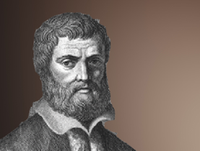 Physician and Master of Medicine - Fixica.
Physician and Master of Medicine - Fixica.
An innovator in the medical field but also a great scholar of ancient treatises, Taddeo Alderotti was one of the most highly regarded university professors of the 13th century. Thanks to him, Medicine became a university discipline.
14th century
Francesco Petrarca
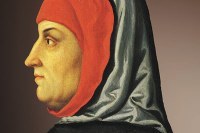 Humanist, Poet, Philologist and Philosopher.
Humanist, Poet, Philologist and Philosopher.
Made to study law by his father, Bologna was the obvious choice for Petrarch’s studies. In the letters he wrote as an older man, he always remembered that period of his youth with a mixture of affection and melancholy; a time spent wandering carefree through the city, all the way up to its hills, enjoying the pleasures of Bologna – a city that he described as not only intellectual, but “fat”.
Biography of Francesco Petrarca
Giovanni da Legnano
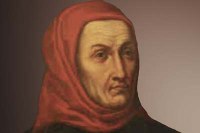 Jurist, Master of Liberal Arts and Canon Law, Politician and Papal Vicar.
Jurist, Master of Liberal Arts and Canon Law, Politician and Papal Vicar.
The story of Giovanni da Legnano is one of the most eloquent: originally a foreigner, he obtained Bolognese citizenship by virtue of his university profession. By drawing on his diplomatic skills, he was appointed to various important political posts and offices in the delicate and frenetic succession of dominions and independences, agreements and schisms of the 14th century.
Biography of Giovanni da Legnano
Mondino De’ Liuzzi
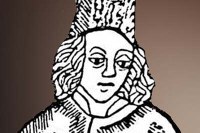 Physician and Anatomist, Professor of Medicine and Philosophy.
Physician and Anatomist, Professor of Medicine and Philosophy.
Mondino is credited with the revolutionary practice of conducting autopsies in the empirical teaching of medicine. This discipline gradually managed to free itself from the theories of the ancients, turning towards a modern conception of knowledge.
Biography of Mondino De’ Liuzzi
Taddeo Pepoli
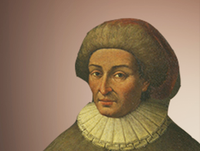 Politician, Jurist, Signore of Bologna, Graduate in Civil Law.
Politician, Jurist, Signore of Bologna, Graduate in Civil Law.
Born to a family of bankers who had made their fortune partly due to the riches that the university brought to the city, Taddeo’s father Romeo soon instilled in his son a new way of doing politics: that of diplomacy and law. With his legal knowledge and his shrewdness, he earned unprecedented power in Bologna.
15th century
Alessandro Achillini
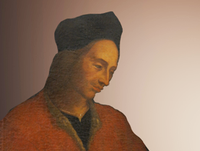 Humanist, Philosopher and Physician, Professor of Logic, Natural Philosophy and Theoretical Medicine.
Humanist, Philosopher and Physician, Professor of Logic, Natural Philosophy and Theoretical Medicine.
Known as “the second Aristotle” by his contemporaries, Alessandro Achillini was a worthy representative of humanistic culture at the turn of the 15th and 16th centuries. A physician and philosopher, he associated himself with the Aristotelian-Averroist movement promoted by the followers of Siger of Brabant, who were partly influenced by the opposing Neoplatonic philosophy.
Biography of Alessandro Achillini
Giovanni Pico Della Mirandola
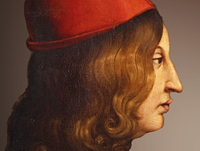 Humanist, Philosopher, Academician.
Humanist, Philosopher, Academician.
Like many other aristocrats, Giovanni Pico della Mirandola also enrolled at the Alma Mater Studiorum without obtaining a degree. The ancient University of Law still attracted young students from all over Europe, perhaps, as in the case of Pico, because it offered them the opportunity to come into contact with philosophers, doctors and astronomers, professors of the most modern and up-to-date University of the Arts.
Biography of Giovanni Pico Della Mirandola
Leon Battista Alberti
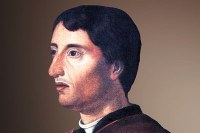 Humanist, Architect, Writer, Mathematician, Prior, Graduate in Canon Law.
Humanist, Architect, Writer, Mathematician, Prior, Graduate in Canon Law.
The destiny of the Renaissance man, after Leon Battista Alberti, was to never be satisfied. Indeed, the symbol chosen by the Renaissance inventor, a thinker who was interested in and wrote about everything over his long career, was a darting eye that flies and scans from above, that investigates and discovers before knowing. He was a polytropic traveller like the Greek Ulysses, a Florentine exile like Petrarch. Like the latter – and exactly one century later – Alberti came to Bologna to study Law, but he left far more enriched by the men-of-letters and scientists who gravitated around the Università degli Artisti, thanks to whom the old ‘Madre degli Studi’ could still call itself ‘Alma’.
Biography of Leon Battista Alberti
Filippo Beroaldo the Elder
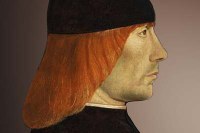 Courtier, Poet, Politician, Philologist and Professor of Humanae Litterae.
Courtier, Poet, Politician, Philologist and Professor of Humanae Litterae.
Commonly referred to as the “commentator of Bologna’s Renaissance”, no one more than Filippo Beroaldo the Elder was able to fully live the dynamic and heterogeneous experience of Bologna under the rule of Giovanni II Bentivoglio.
Biography of Filippo Beroaldo the Elder
Antonio Cortesi Urceo (known as Codro)
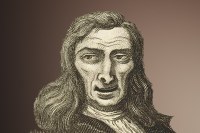 Humanist, Poet, Pedagogue and Professor of Grammar, Eloquence and Greek.
Humanist, Poet, Pedagogue and Professor of Grammar, Eloquence and Greek.
An unconventional and bizarre figure, Urceo Codro represents a particular type of Renaissance courtier, grateful to his benefactors, but always independent and fiercely true to himself. Beloved by his students for his unusually open and engaging way of teaching, he was able to convey to them, albeit with a lowly vocabulary, the complex culture of the period, enriched by the rediscovery of Greek classicism.
Biography of Antonio Cortesi Urceo (known as Codro)
Niccolò Copernico
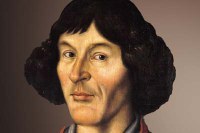 Astronomer, Mathematician, Man of the Cloth. Student of Canon Law at Bologna.
Astronomer, Mathematician, Man of the Cloth. Student of Canon Law at Bologna.
A few days before he died, Nicolaus Copernicus left a testament that would bring humanity into a new age. Science would understand the need for observation, and man would understand that he is not at the centre of the universe. Bologna played a fundamental role in this epochal revolution, inviting the young law student into its humanist and astronomy circles, which were flourishing at the Bentivoglio university in the middle of the fifteenth century.
Biography of Niccolò Copernico
16th century
Achille Bocchi
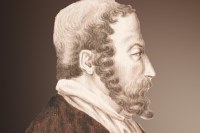 Humanist, Politician, Professor of Greek Literature, Rhetoric, Poetics and Humanity.
Humanist, Politician, Professor of Greek Literature, Rhetoric, Poetics and Humanity.
An eccentric and extravagant humanist, for most of his life Achille Bocchi served as a professor at the University of Bologna, while devoting a considerable amount of time to his private interests. His Accademia degli Hermathena is a typical Renaissance intellectual organisation, eclectic and lively, which left behind a sophisticated iconological primer, penned by Bocchi, entitled Symbolicarum quaestionum.
Gabriele Paleotti
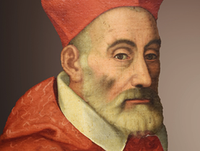 Cardinal, Humanist, Graduate in Civil Law and Canon Law, Professor of Canon Law.
Cardinal, Humanist, Graduate in Civil Law and Canon Law, Professor of Canon Law.
Alongside Carlo Borromeo, Gabriele Paleotti represented the pinnacle of the Catholic reform desired by the Council of Trent but never really implemented in its organisational complexity. A humanist, even before being a man of the cloth, Paleotti was always linked to the University of Bologna. He often tried to soften the strict directives of the Church, being aware of the value of a free culture, albeit controlled by the needs of the time.
Biography of Gabriele Paleotti
Gaspare Tagliacozzi
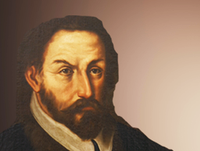 Physician and Professor of Surgery and Theoretical Medicine.
Physician and Professor of Surgery and Theoretical Medicine.
In an Alma Mater that was embarking on its post-Tridentine decline, Gaspare Tagliacozzi was still a leading figure on the international scene. His interest in reconstructive facial operations soon brought him to prominence in the most prestigious courts as a renowned surgeon and anatomist.
Biography of Gaspare Tagliacozzi
Pietro Pomponazzi
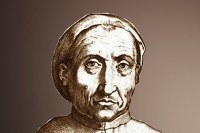 Humanist, Philosopher, Physician and Professor of Philosophy and Natural Philosophy.
Humanist, Philosopher, Physician and Professor of Philosophy and Natural Philosophy.
Pietro Pomponazzi is considered the greatest representative of Renaissance Aristotelian thought, the philosophical centre of which had developed around the University of Padua and which, thanks to him, also developed in the University of Bologna.
Biography of Pietro Pomponazzi
Gerolamo Cardano
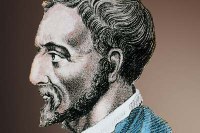 Humanist, Physician, Mathematician, Astrologer, Professor of Medicine.
Humanist, Physician, Mathematician, Astrologer, Professor of Medicine.
In his autobiography, Cardano says “I am disrespectful and I don't hold my tongue”. This frankness characterised him throughout his life, often resulting in confrontations with and accusations from colleagues, students and even the Inquisition. Despite a troubled and difficult existence, he left behind countless speculative works, in which the Renaissance found its raison d'être in the idea that the part contains the whole.
Ulisse Aldrovandi
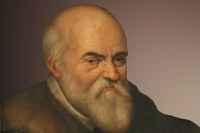 Naturalist and Professor of Logic, Philosophy and Natural Philosophy.
Naturalist and Professor of Logic, Philosophy and Natural Philosophy.
Ever hungry for knowledge, Aldrovandi was the Alma Mater Studiorum’s leading representative of the 16th-century encyclopaedic naturalist approach. During his long life he amassed mineral, plant and animal artefacts and finds from all over the world, putting together the largest “microcosm of Nature” of the time, made available for his studies and teachings and, finally, donated for the glory and use of the entire city of Bologna.
Biography of Ulisse Aldrovandi
Gregory XIII (born Ugo Boncompagni)
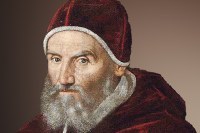 Graduate in Roman and Canon Law, Professor of Law, 226th Pope of the Catholic Church.
Graduate in Roman and Canon Law, Professor of Law, 226th Pope of the Catholic Church.
In troubled, revolutionary times, when Christian Europe was crumbling, the Turkish “enemy” was still at the gates, and the Americas were opening up a new vision of the world, the Church of Rome placed itself in the hands of the Bolognese Ugo Boncompagni, professor of Canon Law at the University of Bologna. Upon becoming Gregory XIII, the jurist pope was particularly deft at concentrating administrative power in his own hands, surrounding himself with charismatic figures such as Carlo Borromeo and Gabriele Paleotti, and delegating the Jesuits with spreading a new-found Catholic spirituality.
Biography of Gregory XIII (born Ugo Boncompagni)
Torquato Tasso
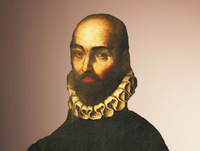 Poet, Courtier, Playwright, Philosopher.
Poet, Courtier, Playwright, Philosopher.
Perhaps the most complex representative of the difficult Counter-Reformation period, Torquato Tasso was a melancholic, roaming courtier, a true genius often misunderstood by his own protectors. At the time of his stay in Bologna as a law student, he had not yet been 'affected' by that obsession with Catholic orthodoxy that would lead him to devote his entire life to continuous reinterpretations of his Gerusalemme Liberata (Jerusalem Delivered).
17th century
Marcello Malpighi
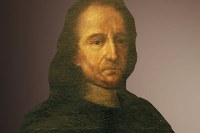 Anatomist, Physiologist, Physician and Biologist, Professor of Logic, Theoretical Medicine and Practical Medicine.
Anatomist, Physiologist, Physician and Biologist, Professor of Logic, Theoretical Medicine and Practical Medicine.
Joining the long Bolognese tradition of anatomical dissection, Malpighi pulled off, although not without suffering speculation and rivalry, the radical inclusion of the medical discipline into the world of experimental science, through microscopic and iatromechanical research.
Giovan Domenico Cassini
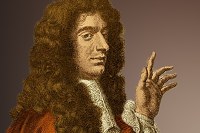 Astronomer, Mathematician, Geographer, Hydraulic and Military Engineer, Professor of Astronomy and Director of the Paris Observatory
Astronomer, Mathematician, Geographer, Hydraulic and Military Engineer, Professor of Astronomy and Director of the Paris Observatory
Even in a difficult period like the 17th century, the faculty of the University of Bologna included some of the most distinguished names in the international scientific community. One of them was Cassini, his fame spreading all the way to the Sun King, who convinced him to leave Bologna to become the director of the newly founded Paris Observatory, which then continued to be run by the descendants of the Ligurian mathematician until the French Revolution.
Biography of Giovan Domenico Cassini
18th century
Anna Morandi Manzolini
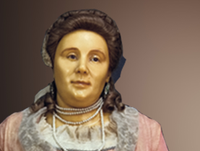 Sculptor and Academician. Wax Modeller at the Anatomy Department.
Sculptor and Academician. Wax Modeller at the Anatomy Department.
Born the year the University of Bologna opened, not that long after Laura Bassi, Anna Morandi was one of the protagonists of a cultural and social reform that took place exclusively in Bologna, albeit briefly. This was the century of the female lecturer. And, indeed, Anna Morandi took up a professorship to impart notions of anatomy and, above all, to advance the knowledge of doctors through her wax works. Her husband Giovanni Manzolini taught her the special art of wax modelling, and she soon became famous for the unique scientific precision of her artefacts.
Biography of Anna Morandi Manzolini
Clotilde Tambroni
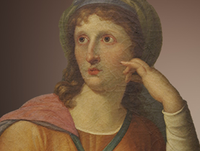 Linguist, Academician, Poet, Professor of Greek Language and Literature.
Linguist, Academician, Poet, Professor of Greek Language and Literature.
Associated with the best European academies and welcomed into Bologna's sophisticated salons as a poet, Clotilde Tambroni was one of a small group of women who brought the Alma Mater to international fame in the second half of the 18th century. These women were allowed to take up professorships with the clear objective of causing a stir, rather than starting a serious academic and social revolution. However, it can safely be said that Tambroni, Bassi, Dalle Donne and Morandi made history, however briefly.
Biography of Clotilde Tambroni
Jacopo Bartolomeo Beccari
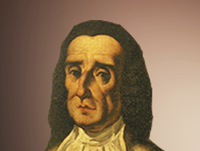 Scientist, Academician, Physician, Lecturer in Logic, Professor of Theoretical Medicine, Practical Medicine, Experimental Physics and Chemistry.
Scientist, Academician, Physician, Lecturer in Logic, Professor of Theoretical Medicine, Practical Medicine, Experimental Physics and Chemistry.
From the discovery of gluten to studies on phosphors; from investigations into the electrophysical properties of amber to an accurate physiological description of the human body: in provincial Bologna, Jacopo Bartolomeo Beccari represented the enlightened European man, capable of connecting various disciplines together. With a number of colleagues, he brought together the Istituto delle Scienze and the Archiginnasio. The professor was the first in Italy to elevate the subject of Chemistry to a university discipline, despite the backwardness of the Università di Bologna at that time.
Biography of Jacopo Bartolomeo Beccari
Luigi Ferdinando Marsili
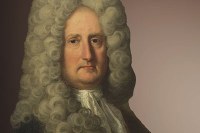 Scientist, Academician, Diplomat, General, Founder of the Istituto delle Scienze in Bologna.
Scientist, Academician, Diplomat, General, Founder of the Istituto delle Scienze in Bologna.
The Alma Mater Studiorum owes much to a man who attended its courses only occasionally - and as a mere unenrolled student - without ever graduating or teaching there. The great cultural reform that was beginning to take hold in Europe at the beginning of the 18th century arrived in Bologna thanks to Luigi Ferdinando Marsili, whose Istituto delle Scienze partly succeeded in putting the University of Bologna and the city itself back on the international circuit.
Biography of Luigi Ferdinando Marsili
Luigi Galvani
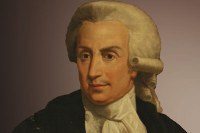 Physician, Physiologist, Physicist, Philosopher, Academician, Professor of Medicine, Surgery, Anatomy and Obstetrics.
Physician, Physiologist, Physicist, Philosopher, Academician, Professor of Medicine, Surgery, Anatomy and Obstetrics.
The father of electrophysiology, Galvani was the most illustrious Bolognese scientist of the 18th century. Through experimentation on frogs, he studied and grasped the functions of nerves and muscles as conductors and receptors of brain stimuli. His famous quarrel with Alessandro Volta led to a short period of oblivion, after which he rose to become a pillar of anatomy and medical electricity, as well as a “hero” of the newly formed Italy.
Laura Bassi
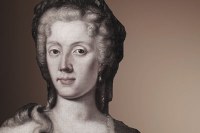 Physicist, Academician, Professor of Natural Philosophy and Experimental Physics.
Physicist, Academician, Professor of Natural Philosophy and Experimental Physics.
The first woman to hold a university professorship, Laura Bassi was an exception. Her training and her bent for science caused the entire University of Bologna to advocate a targeted self-promotion strategy. Having come to an agreement with the academic world, Bassi managed to defend her position and finally obtain the coveted professorship in experimental physics by virtue of her ingenuity rather than her gender.
Maria Dalle Donne
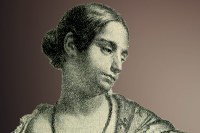 Physician, Academician and Director of the Bologna School of Obstetrics.
Physician, Academician and Director of the Bologna School of Obstetrics.
The University of Bologna’s first female doctor of medicine, Maria Dalle Donne was born the year Laura Bassi died. She soon took her place as an exceptional graduate and teacher, to be celebrated insofar as a woman, but also to be kept to one side, as an extra. She headed the School of Obstetrics for forty years, teaching modern midwives with professionalism and rigour, while the midwives themselves were seeing their ancient profession elevated to the status of a medical discipline, rendering it therefore “necessary” for male doctors to take charge.
Biography of Maria Dalle Donne
Luigi Zamboni
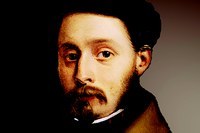 Law Student and Martyr of Independence.
Law Student and Martyr of Independence.
Very few people of Bologna, and even fewer students, know the origin of the name of Via Zamboni, the street on which the city’s University stands. As soon as Italy was united, in 1867, the former Via San Donato was named after the young Law student, Luigi Zamboni, who, in 1795, joined forces with his friend Giovanni Battista De Rolandis and other young men inflamed by French ideals in an attempt to free the city from the absolutism of the Church.
19th century
Augusto Murri
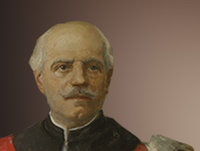 Doctor, Politician, Professor of Medicine and Director of the University of Bologna Medical Clinic.
Doctor, Politician, Professor of Medicine and Director of the University of Bologna Medical Clinic.
Augusto Murri, who directed the new Policlinico Universitario Sant’Orsola from a very young age, is undoubtedly one of the most illustrious clinicians of the late 19th and early 20th century. His medical research led him to anticipate the rationalist method and advocate greater direct observation of patients and their pathologies.
Francesco Rizzoli
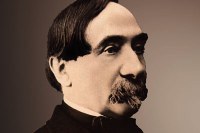 Physician, Surgeon, Hospital Director, Philanthropist, Politician and Senator of the Kingdom of Italy.
Physician, Surgeon, Hospital Director, Philanthropist, Politician and Senator of the Kingdom of Italy.
Wherever he went, he rose to the top as director or administrator. When he was young and penniless, Francesco Rizzoli moved from Milan to Bologna and built a career worthy of his times – a period when physicians and surgeons raised their rank to the highest echelons of society. Solitary and frugal, Rizzoli was tirelessly committed to the social and scientific improvement of his profession, making an immense contribution to the formation of modern orthopaedics and financing an orthopaedic institute in Bologna that remains to this day one of the best in the world.
Biography of Francesco Rizzoli
Giacomo Luigi Ciamician
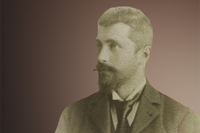 Chemist, Academician, Professor of General Chemistry, Organic Chemistry and Biological Chemistry, City Councillor and Senator.
Chemist, Academician, Professor of General Chemistry, Organic Chemistry and Biological Chemistry, City Councillor and Senator.
Like many other aristocrats, Giacomo Luigi Ciamician also enrolled at the Alma Mater Studiorum without obtaining a degree. The ancient University of Law still attracted young students from all over Europe, perhaps, as in the case of Pico, because it offered them the opportunity to come into contact with philosophers, doctors and astronomers, professors of the most modern and up-to-date University of the Arts.
Biography Giacomo Luigi Ciamician
Giovanni Battista Guglielmini
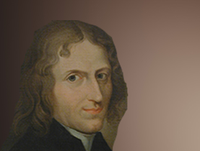 Physicist, Man of the Cloth, Academician, Professor of Sublime Mathematics and Astronomy, Rector of the Alma Mater Studiorum.
Physicist, Man of the Cloth, Academician, Professor of Sublime Mathematics and Astronomy, Rector of the Alma Mater Studiorum.
With remarkable stubbornness, Giovanni Battista Guglielmini managed to overcome the financial straits of his humble origins and the scientific constraints imposed by the Church, becoming one of the greatest luminaries of Astronomy. His experiments definitively validated Copernicus' theories, which also probably germinated in and around the University of Bologna.
Biography of Giovanni Battista Guglielmini
Giovanni Capellini
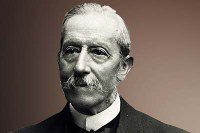 Geologist, Palaeontologist, Rector of the University of Bologna, President of the Italian Geological Society, Senator of the Kingdom of Italy.
Geologist, Palaeontologist, Rector of the University of Bologna, President of the Italian Geological Society, Senator of the Kingdom of Italy.
One of the first in Italy to embrace and circulate Darwin’s revolutionary theories, Giovanni Capellini was one of the rectors most attentive to the modernisation of the University of Bologna and its relaunch onto the international scene in the late 19th century. He was behind the plans for the expansion of the university campus and, most importantly, for the organisation of the festivities for the 8th Centenary, a ceremony that was indispensable for engineering the relaunch of the oldest university in the west on the international stage.
Biography of Giovanni Capellini
Giosuè Carducci
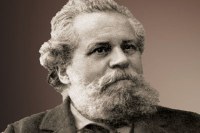 Poet, Literary Critic, Professor of Italian Literature, Senator of the Kingdom of Italy, winner of the Nobel Prize for Literature.
Poet, Literary Critic, Professor of Italian Literature, Senator of the Kingdom of Italy, winner of the Nobel Prize for Literature.
Who but Carducci could have inaugurated the celebrations of the 8th Centenary of the University of Bologna, which had called him, along with other young scholars, to bring it back to its past glories? Just as his Risorgimento poetics drew on the remote classicism of medieval writers, so the university was entering the wider world evoking its glorious past, marked by the rediscovery of Rome’s legal texts. Thus two of Carducci’s missions, that as a poet and that as a teacher, could coincide at Bologna.
20th century
Federigo Enriques
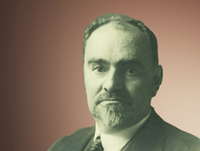 Mathematician, Historian of Science, Philosopher, Professor of Geometry and Mathematics.
Mathematician, Historian of Science, Philosopher, Professor of Geometry and Mathematics.
Believing in the cognitive power of science, Federigo Enriques posed no limits on his interests, considering human understanding as being solely limited by the infinity of objects to be studied. In his mindset, philosophy, mathematics and geometry blended and mutually enriched one another, bringing the humanistic and the scientific disciplines into harmony rather than into contraposition as per the ruling thought of Croce and Gentile’s neo-idealism.
Biography of Federigo Enriques
Giovanni Pascoli
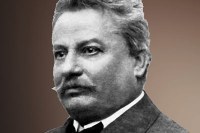 Poet, Academician, Professor of Greek and Latin Grammar and Italian Literature.
Poet, Academician, Professor of Greek and Latin Grammar and Italian Literature.
A life spent seeking refuge so as to rediscover the little boy who had not been able to enjoy much of a childhood, marked as it was by tragedy and mourning. It seems that Giovanni Pascoli was never able to cut his ties with that painful past, in which, however, he found the meaning of life; just as it seems that he was never able to separate his story from that of Bologna, a city that hosted him during his uneasy youth, where he took his degree, and which called him not once but twice to teach at its university.
Guglielmo Marconi
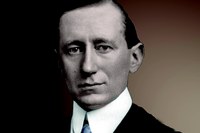 Inventor, Entrepreneur, Senator of the Kingdom of Italy, Nobel Prize in Physics.
Inventor, Entrepreneur, Senator of the Kingdom of Italy, Nobel Prize in Physics.
What sets the young, self-taught Guglielmo Marconi apart, leading him to win the Nobel Prize in Physics, 16 honorary degrees and various international awards, lies in his experimentation from his country villa near Bologna and his pioneering discovery of the entrepreneurial scope of radio signals.
Biography of Guglielmo Marconi
Pier Paolo Pasolini
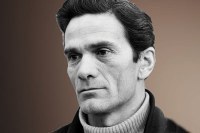 Poet, Writer, Director and Playwright.
Poet, Writer, Director and Playwright.
Pasolini had a very close relationship with Bologna during his secondary school and university years. The University of Bologna remained impressed upon his work, thanks in particular to the lectures given by his art history professor, Roberto Longhi, from whom he absorbed a profound visual culture.
Biography of Pier Paolo Pasolini
Roberto Longhi
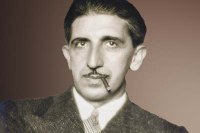 Art Historian, Art Critic and Professor of Art History.
Art Historian, Art Critic and Professor of Art History.
A new way of looking at art was opening up, freed from history and focused on feeling and sensibility. Roberto Longhi, who “discovered” Caravaggio’s everyday drama and noted that, while sombre, Piero della Francesca’s forms were “dressed in colour”, was a great friend of the solitary Giorgio Morandi and taught in the history of art department at the University of Bologna; a department that, with Supino preceding him and Arcangeli coming after, could easily lay claim to being one of the best in the world.
Umberto Eco
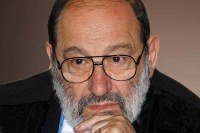 Writer, Semiologist, Literary Critic, Medievalist, Translator, Professor of Semiotics at the University of Bologna, Founder of the Study of Communication Science at Italian Universities and of the Scuola Superiore di Studi Umanistici.
Writer, Semiologist, Literary Critic, Medievalist, Translator, Professor of Semiotics at the University of Bologna, Founder of the Study of Communication Science at Italian Universities and of the Scuola Superiore di Studi Umanistici.
The University of Bologna showered Umberto Eco with all of the titles and awards at its disposal, grateful to the renowned semiologist for having enriched it with his teachings and with the courses that he created and made famous.
Vittorio Puntoni
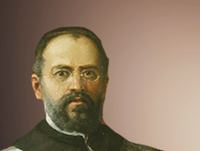 Philologist, Linguist, Rector of the Alma Mater Studiorum, Politician and Academician.
Philologist, Linguist, Rector of the Alma Mater Studiorum, Politician and Academician.
Vittorio Puntoni was the University’s first 20th century rector and, indeed, its longest serving. In his two terms, he governed the University of Bologna for no less than 21 years, ferrying it, with his practical and diplomatic skills, into the modern world.
Felice Battaglia
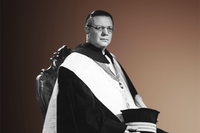 Jurist, Philosopher, Rector of the University of Bologna, Professor of Moral Philosophy and Philosophy of Law, Director of the Institute of Philosophy, Dean of the Faculty of Literature and Philosophy, President of the High Council for Public Education (Palmi, Reggio Calabria, 23 May 1902 - Bologna, 28 March 1977).
Jurist, Philosopher, Rector of the University of Bologna, Professor of Moral Philosophy and Philosophy of Law, Director of the Institute of Philosophy, Dean of the Faculty of Literature and Philosophy, President of the High Council for Public Education (Palmi, Reggio Calabria, 23 May 1902 - Bologna, 28 March 1977).
A high sense of social and intellectual responsibility always characterised his work, both as teacher and as university rector. Under him, the University rose from the devastation of World War II, fully entering a period of economic boom and student participation.
